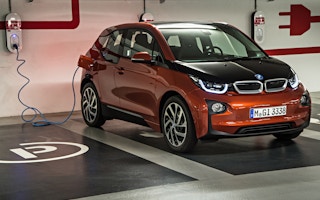Automobile giant BMW has launched its electric car series in Singapore as part of its latest drive to expand the firm’s e-mobility footprint in Asia.
To continue reading, subscribe to Eco‑Business.
There's something for everyone. We offer a range of subscription plans.
- Access our stories and receive our Insights Weekly newsletter with the free EB Member plan.
- Unlock unlimited access to our content and archive with EB Circle.
- Publish your content with EB Premium.
Unveiling the BMW i3 electric vehicle and the BMW i8 plug-in hybrid sports car at an event, BMW Group Asia managing director Sergio Solero said: “BMW i’s arrival in Singapore marks the beginning of a new mobility chapter for the island nation and will revolutionise the way people drive.”
The i3 can go up to 160 kilometres on a single charge, while the i8 has a fuel economy of 2.1 litres per kilometre when driven in urban environments - about a quarter of the fuel consumed by conventional BMW sports models.
The German luxury car manufacturer also announced an ambitious target to cut carbon emissions from the company’s vehicles to 50 percent below 1995 levels by 2050. This is aligned with the firm’s wider electric mobility - or e-mobility - strategy, which aims to use technology, policy and infrastructure development to spur a global shift towards electric vehicles (EVs).
Growth of EVs
“
BMW i’s arrival in Singapore marks the beginning of a new mobility chapter for the island nation and will revolutionise the way people drive.
Sergio Solero, managing director, BMW Group Asia
Electric and hybrid vehiclesare gaining popularity worldwide, driven by the growing need to reduce emissions and minimize the harmful effects of air pollution from vehicles – for example, the World Health Organisation estimates that 3.5 million people die from air pollution due to road transport every year.
In recent years, governments around the world have invested heavily in EV research and infrastructure, with some even providing subsidies and incentives to encourage the purchase of EVs. This has created an attractive environment for car manufacturers to enter the EV market.
BMW said some factors that would spur EV adoption include financial incentives to reduce the cost of buying new electric vehicles and non-monetary support systems like car sharing schemes, charging stations, preferential parking and access to bus lanes, and exemption from road tolls.
Glenn Schmidt, BMW director of steering government affairs, said that it is not enough to “rely on evolutionary incremental steps. A big leap is needed, and that is what e-mobility is all about.”
EVs in Asia
Schmidt also added that scaling up electric vehicle use in Asia was key to addressing the challenges that will come with rapid urbanisation and economic growth in the region.
Sethipong Anutarasoti, director of corporate affairs of BMW Group Asia, said: “In Asia’s increasingly dense cities, you have pedestrians and motorists sharing the same space in densely populated cities, so these cleaner, quieter vehicles create social value.”
However, Asian countries have different levels of infrastructure development and policy incentives to support the entry of electric vehicles into the market. This has in turn shaped where BMW has decided to launch its i series in the region.
Following launches in Japan and Korea last year, the company announced that it plans to launch BMW i vehicles in China in September. It had also announced earlier in February that it would not manufacture the i series in Malaysia due to unclear tax incentives and a lack of infrastructure.
Currently, Singapore has 71 charging stations for electric vehicles. Anutarasoti noted that while every BMW i car was sold with a home charging kit, it was important to make public charging stations more widely available to customers who lived in high-rise apartments.
BMW Group Asia and Performance Motors have jointly invested more than S$5 million in Singapore which will be spent on sales, aftersales, training, communication and infrastructure relating to the EV market.
“We are in dialogue with the government to improve public charging infrastructure, but sometimes, technology moves faster than regulation. But we would like to see this gap bridged soon”, he said.










